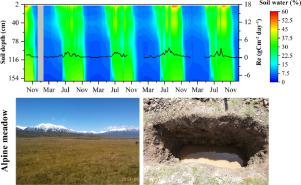当前位置:
X-MOL 学术
›
Agric. For. Meteorol.
›
论文详情
Our official English website, www.x-mol.net, welcomes your
feedback! (Note: you will need to create a separate account there.)
Shallow groundwater inhibits soil respiration and favors carbon uptake in a wet alpine meadow ecosystem
Agricultural and Forest Meteorology ( IF 5.6 ) Pub Date : 2021-02-01 , DOI: 10.1016/j.agrformet.2020.108254 Shaobo Sun , Tao Che , Pierre Gentine , Qiting Chen , Lichun Wang , Zhifeng Yan , Baozhang Chen , Zhaoliang Song
Agricultural and Forest Meteorology ( IF 5.6 ) Pub Date : 2021-02-01 , DOI: 10.1016/j.agrformet.2020.108254 Shaobo Sun , Tao Che , Pierre Gentine , Qiting Chen , Lichun Wang , Zhifeng Yan , Baozhang Chen , Zhaoliang Song

|
Abstract Wet alpine meadows generally act as a significant carbon sink, since their low rate of soil decomposition determines a much smaller ecosystem respiration (Re) than photosynthesis. However, it remains unclear whether the low soil decomposition rate is determined by low temperatures or by nearly-saturated soil moisture. We explored this issue by using five years of measurements from two eddy-covariance sites with low temperature and significantly different soil water conditions. The results showed that both sites were carbon sinks. However, despite a smaller annual gross primary productivity, the wet site with a shallow groundwater showed a much higher carbon use efficiency and larger carbon sink than the dry site (which had a deeper water table) due to its much lower Re. Our analyses showed that Re of the wet site was significantly decreased under the nearly-saturated soil condition during the unfrozen seasons. This effect of nearly-saturated soil water on Re increased with soil depths. In contrast, at the dry site the high soil water content favored Re. The corresponding soil temperature at both sites expectedly showed large and positive effects on Re. These results demonstrated that the high carbon sink of the wet alpine meadow was mainly caused by the inhibiting effects of the nearly-saturated soil condition on soil respiration rather than by the low temperatures. Therefore, we argue that a warming-induced shrinking cryosphere may affect the carbon dynamics of wet and cold ecosystems through changes in soil hydrology and its impact on soil respiration. In addition, our study highlights the different responses of soil respiration to warming across soil depths. The thawing of frozen soil may cause larger CO2 emission in the top soil, while it may also partially contribute to slowing down soil carbon decomposition in the deep soil through decreasing metabolic activity of aerobic organisms.
中文翻译:

浅层地下水抑制土壤呼吸并有利于潮湿高山草甸生态系统中的碳吸收
摘要 潮湿的高山草甸通常充当重要的碳汇,因为它们的土壤分解率低,决定了比光合作用小得多的生态系统呼吸 (Re)。然而,目前尚不清楚低土壤分解率是由低温决定还是由接近饱和的土壤水分决定。我们通过使用来自两个低温和显着不同土壤水分条件的涡度协方差站点的五年测量来探讨这个问题。结果表明,这两个地点都是碳汇。然而,尽管年初级生产力总量较小,但由于 Re 低得多,地下水浅的湿地比干地(地下水位更深)显示出更高的碳利用效率和更大的碳汇。我们的分析表明,在解冻季节,在接近饱和的土壤条件下,湿地的 Re 显着降低。近饱和土壤水对 Re 的这种影响随着土壤深度的增加而增加。相比之下,在干旱地区,高土壤含水量有利于 Re。预计两个地点相应的土壤温度对 Re 显示出巨大而积极的影响。这些结果表明,湿高寒草甸的高碳汇主要是由近饱和土壤条件对土壤呼吸的抑制作用而不是低温引起的。因此,我们认为,变暖引起的冰冻圈缩小可能通过土壤水文变化及其对土壤呼吸的影响来影响湿冷生态系统的碳动态。此外,我们的研究强调了土壤呼吸对土壤深度变暖的不同反应。冻土的解冻可能会导致表层土壤中更大的 CO2 排放,同时它也可能通过降低需氧生物的代谢活动,部分有助于减缓深层土壤中的土壤碳分解。
更新日期:2021-02-01
中文翻译:

浅层地下水抑制土壤呼吸并有利于潮湿高山草甸生态系统中的碳吸收
摘要 潮湿的高山草甸通常充当重要的碳汇,因为它们的土壤分解率低,决定了比光合作用小得多的生态系统呼吸 (Re)。然而,目前尚不清楚低土壤分解率是由低温决定还是由接近饱和的土壤水分决定。我们通过使用来自两个低温和显着不同土壤水分条件的涡度协方差站点的五年测量来探讨这个问题。结果表明,这两个地点都是碳汇。然而,尽管年初级生产力总量较小,但由于 Re 低得多,地下水浅的湿地比干地(地下水位更深)显示出更高的碳利用效率和更大的碳汇。我们的分析表明,在解冻季节,在接近饱和的土壤条件下,湿地的 Re 显着降低。近饱和土壤水对 Re 的这种影响随着土壤深度的增加而增加。相比之下,在干旱地区,高土壤含水量有利于 Re。预计两个地点相应的土壤温度对 Re 显示出巨大而积极的影响。这些结果表明,湿高寒草甸的高碳汇主要是由近饱和土壤条件对土壤呼吸的抑制作用而不是低温引起的。因此,我们认为,变暖引起的冰冻圈缩小可能通过土壤水文变化及其对土壤呼吸的影响来影响湿冷生态系统的碳动态。此外,我们的研究强调了土壤呼吸对土壤深度变暖的不同反应。冻土的解冻可能会导致表层土壤中更大的 CO2 排放,同时它也可能通过降低需氧生物的代谢活动,部分有助于减缓深层土壤中的土壤碳分解。











































 京公网安备 11010802027423号
京公网安备 11010802027423号